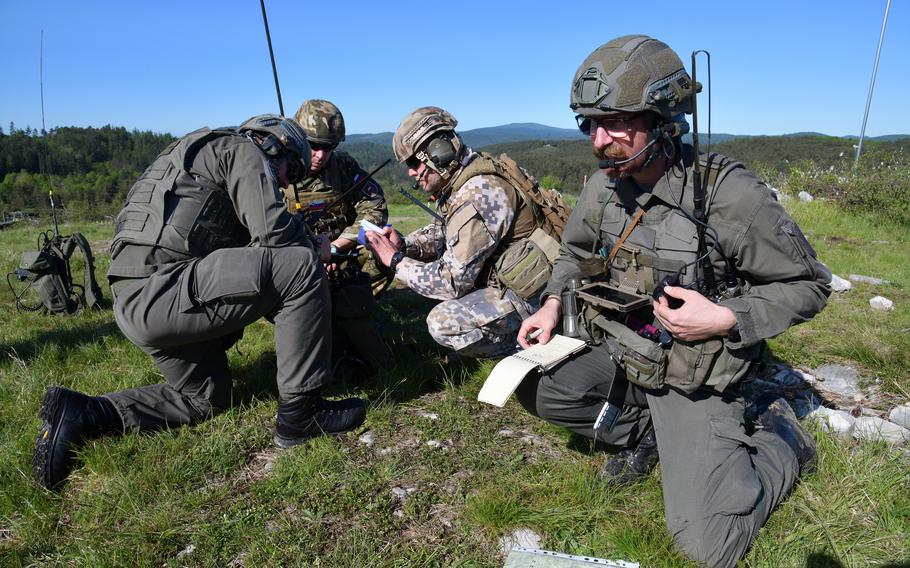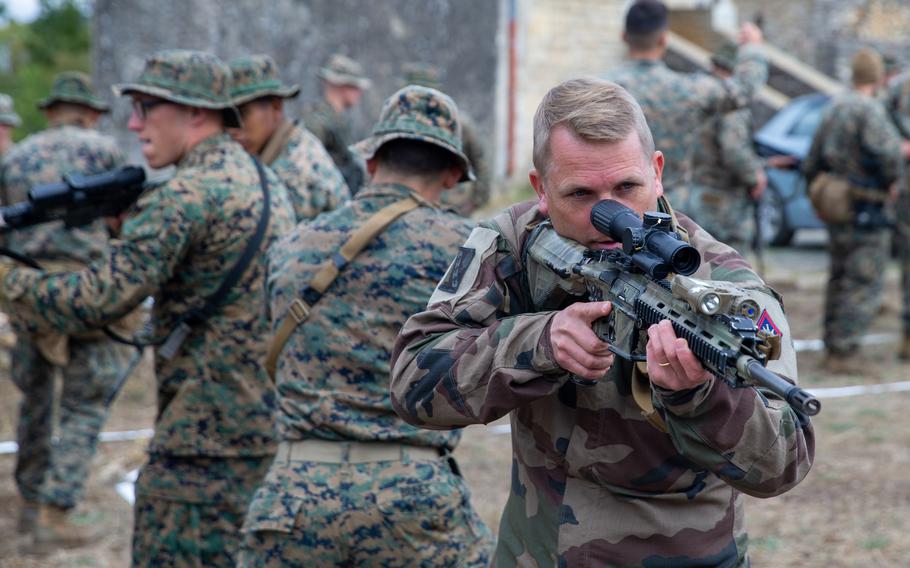
Joint terminal attack controllers from Slovenia, Latvia and Austria prepare to call for fire during an exercise in Slovenia, in 2021. A majority of Americans and western Europeans want a push for a negotiated end to the war in Ukraine, according to a poll released this month by the Institute for Global Affairs. (Paolo Bovo/U.S. Army)
STUTTGART, Germany — A majority of Americans and western Europeans want allies to push for a negotiated end to the war in Ukraine while shifting the bulk of the security burden on the Continent from the United States to Europe, according to a new poll.
The survey, released this month by the Institute for Global Affairs at the Eurasia Group, sought the views of 3,360 Americans and those residing in Europe’s three most powerful countries: the United Kingdom Germany and France.
The findings are somewhat at odds with U.S. President Joe Biden’s position, which has centered on the idea that it’s up to Ukraine to determine how the conflict ends.
“The data reveal people are attentive to the risks of escalation and compassionate toward Ukrainians’ plight, but they are less insistent than their political leaders who assert this war must be fought for the cause of democracy itself or to fully repel Russia to its pre-invasion borders,” the Eurasia Group survey said in a summary of the findings.
Fewer than one in five of those polled said the West should not seek to influence Ukraine in its war.
“People want Western governments to encourage a negotiated settlement primarily because of the human toll,” the report said.
Those polled were asked to select from a series of reasons for or against a negotiated end to the war. The tallies added up to more than 100% because respondents were allowed to select up to two answers.
Reasons to push for a deal included the high casualty numbers, fears that the West lacks the industrial capacity to protect itself while also supplying Ukraine, and acceptance of an imperfect victory while Kyiv still has some leverage.

A French soldier trains with U.S. Marines during an exercise in France in 2022. A majority of Americans and western Europeans said the bulk of the security burden in Europe should be carried by European nations, according to a poll released this month by the Institute for Global Affairs at the Eurasia Group. (Christopher Doughty/U.S. Marine Corps)
In the United States, such reasons for ending the war accounted for 94% of the responses in favor of a negotiated end to the conflict, compared with 88% in Europe.
Among those who oppose pushing for immediate negotiations, some answered that Russia must be further weakened militarily before talks or that the decision is up to Ukraine.
In the U.S., 34% held such views. And 6% opposed negotiations because they consider Russia’s territorial claims in Ukraine legitimate. Such opinions roughly lined up with those of western Europeans polled.
Meanwhile, there was agreement on both sides of the Atlantic that the time has come for Europe to shoulder a larger share of the security burden on the Continent. Majorities in all four countries surveyed thought Europe should be primarily responsible for its own defense, the Eurasia Group report said.
“The most popular position within each of the four countries surveyed is that Europe should seek to preserve U.S. security guarantees through NATO but otherwise take primary responsibility for its own defense,” the report said.
Only 13% in France, 8% in the United Kingdom and 7% in Germany said the American military should be the main security provider on the Continent. Americans were more inclined to favor the idea of being the military heavyweight in Europe, with 18% of those polled supporting the idea.
Still, years of underinvestment in defense has raised questions about whether U.S. allies in Europe are up to the task of defending the Continent in the event of conflict with Russia. That could explain why a plurality of people in the three European countries polled favored the status quo when it comes to maintaining the American troop presence in Europe.
But if changes were to be made, more people on both sides of the Atlantic favor a reduction of troop levels than those advocating a larger presence.
In the United States, 43% favored either cutting the number of American forces or getting them out of Europe altogether, a slightly larger percentage than was found in France, Germany and the United Kingdom. Only 11% of Americans wanted to increase current troop numbers.
The survey was done between April 8 and April 15 and had a margin of error of 1.8 percentage points.